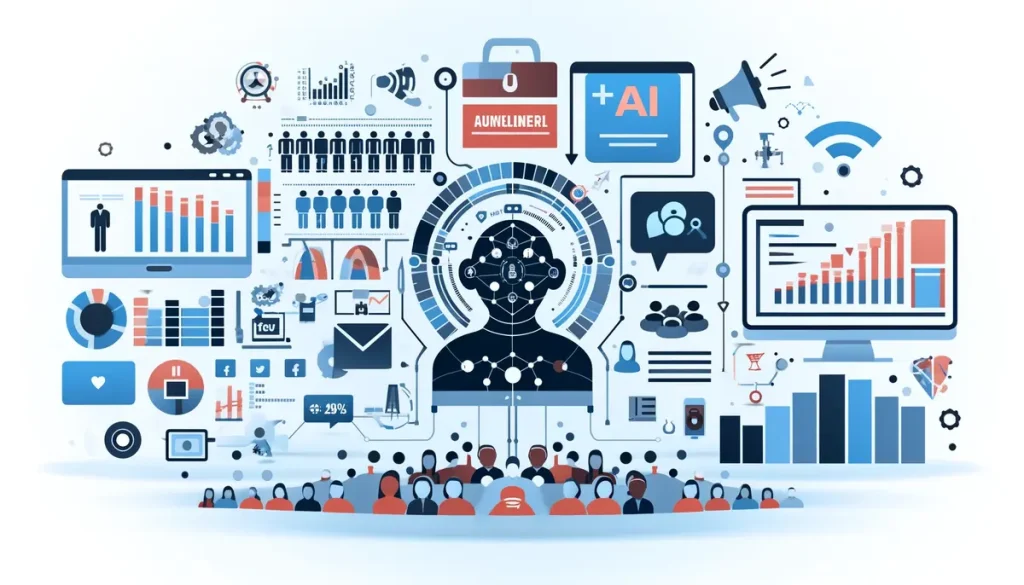In the digital market, understanding your target audience is more crucial than ever. The precision with which a business can identify and cater to its specific audience directly influences its marketing effectiveness, customer satisfaction, and ultimately, its return on investment. Recently, Artificial Intelligence (AI) has begun to transform the traditional landscape of audience targeting, offering unprecedented accuracy and efficiency. This blog explores the role of AI in audience targeting, and how AI is revolutionizing the way businesses engage with their target audiences, ensuring marketing strategies are as effective as possible.
Read More: How to Use AI in Email Marketing: A Practical Guide
The Shift from Traditional Methods to AI in Audience Targeting
Traditional marketing methods have typically relied on demographic data such as age, gender, and location to identify target audiences. However, these methods often fall short in accurately predicting customer preferences and behavior, leading to less effective marketing campaigns and wasted resources. The advent of AI in audience targeting has marked a significant evolution, moving beyond basic demographics to a more nuanced understanding of consumer behaviors and preferences.
AI-driven targeting uses advanced algorithms to process vast amounts of data, identifying patterns that were previously undetectable. This capability allows businesses to not only understand who their customers are but also predict what they will need in the future. By integrating AI, companies are seeing a remarkable improvement in campaign precision and a reduction in wasted expenditure.
How AI Enhances Audience Targeting
Data Collection and Processing
AI excels in gathering and analyzing extensive data sets from a variety of sources, including social media activity, browsing histories, and purchase behaviors. This data is critical for:
- Uncovering emerging trends
- Detecting consumer behavior patterns
- Gaining deep insights into audience preferences
The ability of AI to continuously learn from data means that it becomes more accurate over time, constantly improving its predictions and recommendations for targeting.
Machine Learning and Pattern Recognition
Machine learning, a core component of AI, enables systems to learn from and make decisions based on data. In the context of audience targeting, machine learning algorithms play a crucial role in:
- Recognizing and adapting to new consumer behavior patterns
- Enhancing the personalization of marketing messages
- Ensuring that marketing strategies remain relevant
These capabilities make AI-driven strategies far more adaptable and effective compared to traditional methods.
Predictive Analytics and Audience Profiling
Predictive analytics in AI uses historical data to make forecasts about future behavior, specifically in terms of audience engagement and conversion probabilities. AI-generated audience profiles help businesses to:
- Understand subtle nuances in customer preferences and habits
- Tailor marketing strategies to match the unique demands of different segments
- Increase the relevance and effectiveness of marketing campaigns
This targeted approach helps in crafting highly personalized marketing messages that resonate well with the intended audience.
The Role of Deep Learning in Refining Audience Insights
Deep learning, a subset of machine learning, uses complex algorithms to process and analyze data at an advanced level. This technique is particularly effective at:
- Identifying hidden patterns within large data sets
- Improving the granularity of audience segmentation
- Enhancing the predictive capabilities of marketing models
Deep learning’s advanced pattern recognition significantly boosts the accuracy of AI-driven audience targeting, making it a valuable tool for marketers aiming to cut through the noise and reach their consumers more effectively.
Key Benefits of Using AI for Audience Targeting
Employing AI in audience targeting offers several tangible benefits that help businesses streamline their marketing efforts and enhance customer relationships:
- Improved Accuracy and Efficiency: AI reduces the guesswork in marketing, helping businesses reach the right audience with the right message at the right time.
- Hyper-Personalized Marketing Campaigns: With AI, marketers can create customized campaigns that speak directly to individual preferences and needs, resulting in higher engagement rates.
- Enhanced Customer Engagement and Retention: Personalized interactions foster deeper connections with customers, encouraging loyalty and long-term engagement.
- Optimized Marketing Budgets and ROI: By targeting more precisely, companies can allocate their resources more effectively, maximizing the impact of every dollar spent.
Implementing AI in Your Marketing Strategy
Before integrating AI into your marketing efforts, it’s essential to assess your current audience targeting strategies and identify areas for improvement. Here are steps to ensure a smooth integration:
- Evaluate Existing Methods: Understand the limitations of your current targeting approaches and how AI can address these gaps.
- Define AI’s Role: Clearly outline how AI will be used in your strategy to enhance targeting accuracy and campaign personalization.
- Monitor and Adjust: Continuously track the performance of your AI-enhanced campaigns using key performance indicators. Adjust your strategies based on these insights to optimize results.
The Future of AI in Marketing
As AI technology continues to advance, its capabilities in understanding and predicting customer preferences will only grow stronger. This progression promises even more sophisticated targeting strategies, enabling marketers to stay ahead of the curve and achieve unprecedented levels of personalization and efficiency in their campaigns.
Navigating Ethical Considerations
While AI offers numerous advantages, it also brings potential ethical challenges that businesses must navigate carefully:
- Data Privacy: Ensure that customer data is handled with the utmost care, respecting privacy laws and regulations.
- Bias Mitigation: Actively work to identify and eliminate biases in AI algorithms to prevent unfair targeting practices.
- Transparency: Maintain open communication with customers about how their data is being used and the measures in place to protect their privacy.
Conclusion
AI-driven audience targeting is not just a technological upgrade—it’s a competitive advantage that can significantly enhance the precision, efficiency, and effectiveness of marketing campaigns. By embracing AI, businesses can not only meet but exceed the evolving expectations of their customers, ensuring sustained growth and success in the digital age. As we look to the future, the integration of AI in marketing strategies is not just advisable; it’s imperative.

